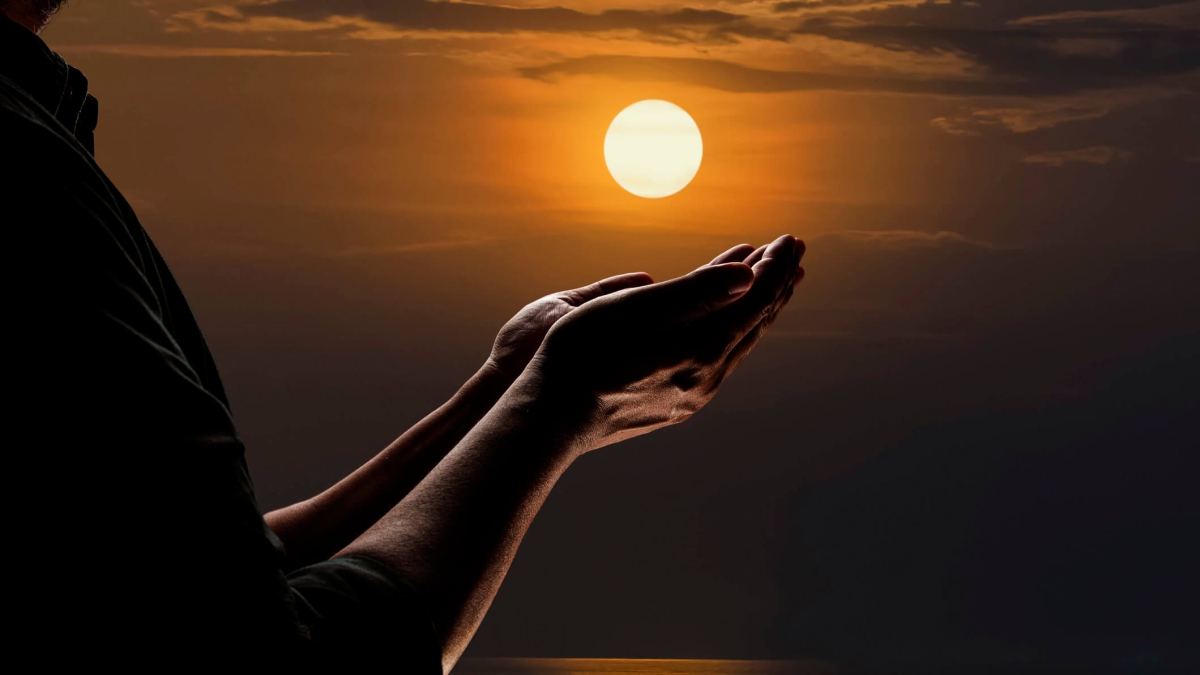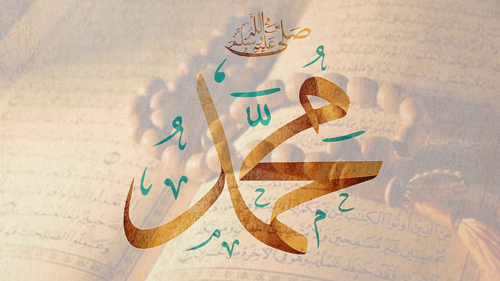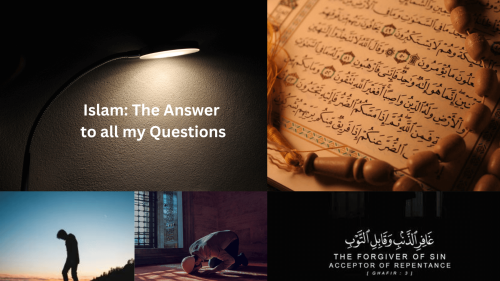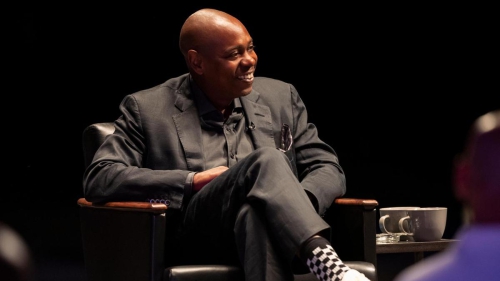Three Stages of Guidance: Based on Prophet Ibrahim’s Example

Almighty Allah says in the Qur’an: “And thus did We show Ibrahim (Abraham) the realm of the heavens and the earth that he would be among the certain (in faith). So when the night covered him (with darkness), he saw a star. He said, “This is my lord.” But when it set (disappeared), he said, “I like not those that disappear.” And when he saw the moon rising, he said, “This is my lord.” But when it set (faded away), he said, “Unless my Lord guides me, I will surely be among the people gone astray.” And when he saw the sun rising, he said, “This is my lord; this is greater (the greatest of all).” But when it too set (faded away), he said, “O my people, indeed I am free from what you associate with Allah. Indeed, I have turned my face towards He who created the heavens and the earth, inclining towards truth, and I am not of those who associate others with Allah” (al-An’am, 75-79).
What follows is a reading of an aspect of the wisdom contained in the quoted verses.
From a perspective of the guided, guidance has three stages: first: searching, coupled with restlessness; second: desperation, which may lead to resignation and even anxiety; third, admission and bearing witness to the truth.
First stage
The first stage is based on the following words: “So when the night covered him (with darkness), he saw a star. He said, “This is my lord.” But when it set (disappeared), he said, “I like not those that disappear.”
The purpose of one’s life is to seek, find, internalize and live the truth. He begins by freeing himself from unworthy concerns. He unshackles his fitrah (inborn disposition for submitting one’s self to and worshipping the Creator), enabling it to function properly and to yearn for the truth. An avalanche of questions and concerns follows next.
This condition is compounded by a person becoming conscious of the presence of Allah’s innumerable signs scattered throughout the heavens and the earth. He cannot comprehend them, but he knows that there exist other dimensions. Life is so beautiful and so complex to be reduced to a series of coincidences, or to the criteria of one’s, or a group’s, subjective preferences (socio-cultural constructs).
Answers are yet to come, but the stage is set for a change. Regardless, a person knows that the truth should be somewhere out there, and he is happy with that realization. He is up for a ride, which nevertheless is full of possibilities. He should remain positive and take things in stride. A happy ending, no matter when it comes, is all that matters. Asking questions without getting answers is a better state than not asking questions at all. The former will eventually lead to some or all answers, whereas the latter will lead nowhere.
The ideologies, philosophies and systems of life that hitherto were served to such a person, turned out to be inadequate. Everything proved unwholesome and wanting. One’s own life trajectory - as much its outer displays as inner recesses - stands for a conclusive proof. A person then rejects the pompous alternatives, harbouring no qualms whatsoever about doing so. He knows that he is better off being insignificant and empty, albeit liberated from the fetters of falsehoods and darknesses, than being loaded with – and inhibited by - the latter’s venomous ingredients.
Showing “the realm of the heavens and the earth” – as per the above verses – signifies the objectivity of the truth, the ubiquitous presence of Allah’s signs, and the place, as well as mission, of man in the universe.
“When the night covered him with darkness” means the effects of the vicissitudes of life on a person’s thinking and behaviour. The ups and downs of life are not in a person’s hands, but how he responds to them is. They are furthermore inevitable, but his – or anybody’s - misguidance is not.
Seeing a star and declaring that such is the lord indicates a person’s response. It is a wrong one, but it is a choice nevertheless. A person must live with his preferences and be ready to face the consequences. It is therefore rightly said that people live and die with their choices. In any case, freedom, consistency and transparency are the key.
The disappearance of the star brings to mind one of many realities pertaining to life. That reality is to the effect that just as the truth is self-evident – if a person wants and is ready to witness it – so are the truth’s antitheses. Their pretentious claims are all around, and so are their flaws and failures as well.
A person’s job is to transcend the showiness and penetrate deep into the core of the forms of falsehood. Seeing thus the things as they actually are, he will be able to proclaim – under the sway of the fitrah and intelligence as the Creator’s gifts to mankind – that he does not like, nor subscribe to, any ideology or system that is morbid and perishable (Ibrahim’s words: “I like not those that disappear”).
However, to do this, a person will have to open his mind and sharpen his senses. He will have to be himself, just as he was envisioned by his Creator: inquisitive, willing and honest. He will have to be able to see and discern, exactly as Ibrahim observed and was able to comprehend the case of the star. A person cannot incapacitate his powers and dull his talents. Doing so is an ontological crime for which he will be held accountable on the Day of Judgment.
A person must declare a war against whatever works against him and his latent fortes. Everyone is intended to be an honourable servant of Allah, entrusted with the honourable mission of vicegerency on earth, for which awaits the honourable end in Paradise, rather than becoming a greedy beast, an immoral wretch, and a cultural as well as civilizational hypocrite.
For example, paying no attention to the dynamics of life and death and its implications for one’s existence is but a sign of one’s intellectual, spiritual and moral paralysis. Moreover, being trapped in the material dimension of life only, immersing himself completely in hedonism or pleasure-seeking and staying indifferent to and aloof from other dimensions, is nothing but a symptom of one’s blindness. In this manner, a person becomes dead before his actual death, and suffers before his actual suffering in the Hereafter. Only to such people can the perishability and unwholesomeness of deceit be served. It is only they who will be able to buy it.
Observing and reading the world (the universe) is projected to break the spell and set a person on the path for a new beginning.
Second stage
The second stage of guidance is featured in these words: “And when he saw the moon rising, he said, “This is my lord.” But when it set (faded away), he said, “Unless my Lord guides me, I will surely be among the people gone astray.”
In his wanderings and confusion, an awakened person will intensify his search, consistent with an increase in his thirst for the truth. With the scope widened, a person will start feeling lonely and insecure ever more. From the inception of creation, he was meant for the truth and the truth was meant for him. An estrangement between them, it goes without saying, leads to a ruinous anomaly.
This denotes that without the truth on-board a person is not himself. He is an incomplete creature. Being on his own is neither natural nor productive. A person starts feeling the real pain only when he rejects the blindness and the resultant waywardness, and when he comes to terms with what is really going on.
What follows after that is a person stopping at nothing in trying to find answers. He will go to the extremities of life and of whatever people could offer as substitutes to the truth. He will be driven by the conventional - albeit not necessarily true - logic that the bigger and more hyped means the further and better. People often think that size and propaganda matter, appearing and sounding somehow more convincing.
However, when even these steps turn out to be futile, a person’s condition becomes dire, so much so that he yet starts entertaining the possibility of staring at a cul-de-sac at the end of the day, which would be unthinkable. There must be a way out; there must be a remedy – he will think. Otherwise, nothing would make sense. It is impossible that things in life make perfect sense, but not life itself. The search must go on, in spite of the growing anguish experienced on the way.
The concept of the “rising moon”, whose emergence eclipses and presence outlives the presence of the mentioned star – as in the verses mentioned above – implies a person’s progression towards the truth. The greatness of the moon symbolizes how far a person is ready to go in his desperate quest. No stone is to be left unturned and no luminosity (cerebral luminary and authority) is to be left untapped in the process. The brilliant light of the moon - a central theme in all human art, literature and popular culture - calls to mind the extent of hopes, but its eventual fading away and total disappearance say everything about the corresponding dreadful consequences.
At that point, a person, resigned and fearful, gets to know that the only hope resides in Heaven and can come from the Creator. This insight, nonetheless, can be either in definitive or tentative terms, subject to a great many internal and external considerations surrounding a person’s life. A person can speak a clear or an ambiguous language; however, his intentions are more than apparent. A simple gaze towards Heaven, in desperation - having become disappointed with the offers of this world - says it all.
This world cannot be the source of the truth, but merely its recipient and the locus of its application. The truth is spiritual with physical means and contexts. Thus, for a person to forge a successful relationship with the truth, he ought to activate his material and immaterial, bodily and spiritual, sides. He needs to choose the truth, instead of waiting to be chosen by it. He furthermore needs to keep moving towards the truth, as opposed to waiting passively for the truth to come on its own and impose itself – which however never happens.
The words of Prophet Ibrahim “unless my Lord guides me, I will surely be among the people gone astray” mean the following – and Allah knows best.
Allah as the Absolute Creator and Master of the universe knows everything and acts wisely and justly. Nothing escapes His infinite knowledge, will and power. Accordingly, He knows what a person freely chooses and willingly does. He thus guides only those who want and deserve to be guided, and leads astray only those who want and deserve to be sent astray.
A person chooses what to do, while Allah accepts, endorses, facilitates and rewards for the choices made and deeds performed. A person’s life is a subtle blend and interplay of personal freedom and divine providence. As a sign of His unbounded Sovereignty, Allah reiterates that although free, a person is subjected to His Will and Authority. If He so wills, Allah can always overrule a person’s freedom, choices and intended actions.
What is more, that Allah is the only one who guides means that a person cannot be guided – or cannot guide himself - except through and by the prophets and the heavenly messages revealed to them. Without them, a person will remain forever short of getting to the bottom of myriads of existential secrets and mysteries. In the absence of a divine help, the intellect and senses of a person are verified inept to guide him to all truth. They are good merely as far as they go. However, they possess enough capacity to lead - or “guide” – a person to the threshold of recognizing and accepting the revelation as the supreme source of guidance and truth.
A person’s efforts to rival the revelation and Heaven are destined to fall flat. Which ultimately means that there is no guidance but the guidance of Allah, and if He does not guide, nobody else can. Other alternatives are deficient.
Praying for guidance means expressing readiness and resolve to enhance the relationship with Allah as the source and legitimacy of all guidance. It means acknowledging Allah as the Creator, Master and Self-sufficient, and acknowledging man as no more than a creation, servant and needy. It likewise means registration of willingness, productivity, patience and steadfastness in adhering to the path of righteousness, while fully capitalizing on the boons of free will and sound reason.
That is why at one point Ibrahim said to his father: “Follow me, I will guide you to a right path” (Maryam, 43). That is to say, make a move, follow the source of guidance, and come yourself to the threshold of the truth, only then will you be guided. Unless you do so, positively, there will be no guidance for you.
Third stage
The third and final stage of guidance is implied in these words: “And when he saw the sun rising, he said, “This is my lord; this is greater (the greatest of all).” But when it too set (faded away), he said, “O my people, indeed I am free from what you associate with Allah. Indeed, I have turned my face towards He who created the heavens and the earth, inclining towards truth, and I am not of those who associate others with Allah.”
This is the moment when the truth is revealed to a truth-seeker and when there is nothing else standing between him and the found truth. It is the moment of truth – literally. The “rising sun”, which is the greatest of all hindrances and alleged sources of and alternatives to the truth, represents the turning point. It is the last phase in the process of demystifying the world and juxtaposing its insignificance with the consequentiality of the truth and the Hereafter. Personal demons are defeated and cast out forever.
When such happens, all events and experiences on earth – regardless of how big and important they may seem in the eyes of the intellectually impaired and spiritually blinded ones – become negligible and virtually nothing. It is only the truth that stands out - and alone. There is nothing else that truly exists. There is nothing that is worthy of comparison with, let alone challenging, the truth. The greatest of all (“the rising sun”) challengers have fallen, quickly fading into oblivion. Against the backdrop of the standards of the truth, they were but shadows mistaken for genuine realities. They were deterring mirages.
The “rising” was bogus, which, as soon as exposed, turned into “falling” and “vanishing”. The same holds true concerning the role of “the sun” itself, which when needed the most, let people (devotees of false ideologies) down. The rising of the truth nullified them all. Indeed, no “rising” of a bogus idea can withstand the “rising” of the truth; nor can the light of such ideas affirm its poise in the company of the light of the truth. As the Qur’an validates: “And say, “Truth has come, and falsehood has vanished. Indeed is falsehood, (by nature), ever bound to vanish” (al-Isra’, 81).
Subsequently, in front of a seeker of the truth the truth emerges as the only undeniable actuality, not just in the metaphysical, but also the physical sense. This is often accompanied by an ecstasy, which demonstrates the climax of a journey of pursuing the truth. It means so much to a fortunate person, as a result of which he hides neither his emotions nor his commitment to serving the discovered truth. A guided person identifies himself with the truth. Yet, he becomes its epitome; he becomes the truth.
Hence the words “O my people, indeed I am free from what you associate with Allah”, which is an attestation to the most beautiful of feelings and the greatest of freedoms, and “I have turned my face towards He who created the heavens and the earth, inclining towards truth, and I am not of those who associate others with Allah”, which is the strongest confirmation that a person is ready to live for and in the name of the truth. This is because, at another place in the Qur’an, submitting one’s face to Allah, while being a doer of good (here implied by inclining towards the truth and not committing any sort or degree of polytheism) is the only guarantee of success and of one’s admission to Paradise (al-Baqarah, 111-112).
Finally, it is appropriate that one’s quest for the truth begins with the turning of his intelligence and fitrah towards the realm of the heavens and the earth, and that the same quest ends with the turning of one’s face towards He who created the same realm. As if things come full circle, proving that appropriately reading the creation inevitably leads to the Creator.
Topics: Day Of Judgement, Declaration Of Faith (Shahada), Destiny (Qadr), Fitra (Original Disposition), Free Will, Hypocrisy, Life And Death, Life Hereafter (Akhirah), Metaphysics, Paradise (Jannah), Reasoning, Soul (Nafs), Universe, Viceregency Values: Guidance, Honesty, Spirituality, Truthfulness Channel: My Journey To Islam
Views: 3226
Related Suggestions





























